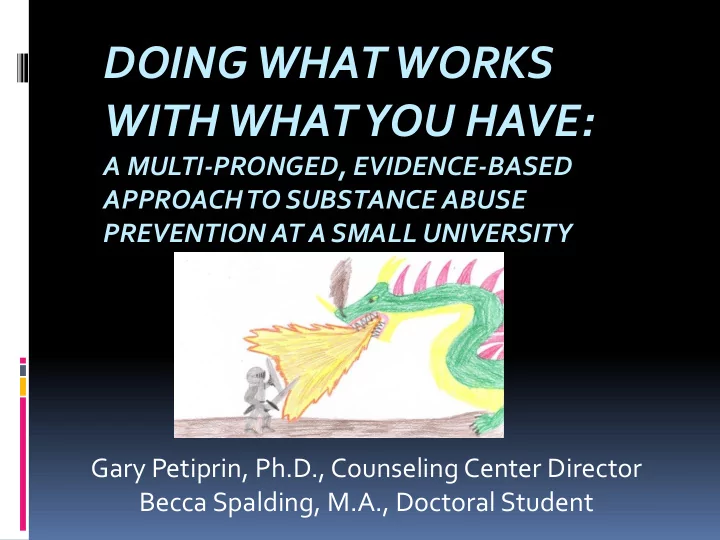

DOING WHAT WORKS WITH WHAT YOU HAVE: A MULTI-PRONGED, EVIDENCE-BASED APPROACH TO SUBSTANCE ABUSE PREVENTION AT A SMALL UNIVERSITY Gary Petiprin, Ph.D., Counseling Center Director Becca Spalding, M.A., Doctoral Student
About Bellarmine • Private, Independent Catholic • Urban setting • 3500 students • 2/3 undergraduate • ½ residential • Athletic program • Small Greek presence • Counseling Center (3 FTE)
AOD Prevention Efforts Strategic Planning Data Collection Education/Prevention Policies Sanctions Interventions Community Coalitions
NIAAA 3-in-one Framework Environment Population Individual
Evidence-Based Strategies (NIAAA Report) Tier 1: evidence for college populations CBT/Motivational Enhancement (BASICS; AlcoholEdu) Tier 2: evidence for non-college population Enforcement of laws; publicizing laws; working with local retailers Tier 3: promising evidence Environmental strategies; rule enforcement and publicizing rules and sanctions; parental notification Tier 4: no evidence Information only (stand alone); one-time speakers or awareness weeks
Strategic Planning AOD Working Group Biennial Review
Data CORE Survey (2009; this fall) ACHA (2010)
Coalition (environment) ISAP (Intercollegiate Substance Abuse Prevention group) BRICC Coalition (U of L)
Alcohol Policy (population) No student may possess or consume alcohol on campus unless at registered events and 21 years of age. No public intoxication (even if consumed off campus). No violation of other state or local laws (e.g. driving under the influence, distribution to minors).
Sanctions First offense - Warning and completion of AlcoholEDU for Sanctions within time frame allotted by Hearing Officer, Substance Education Fund Fine of $100 Second offense - Substance Education Fund fine of $150 Third offense - University Probation and Parental Notification Fourth offense - University Suspension Additional sanctions may be assigned as deemed necessary by the appropriate student conduct body. Additional sanctions may include, but are not limited to, assignment of community service hours, residence hall probation, educational sanctions, restitution, etc.
Education (target groups) Peer Educator Program Collaborative Programming: Res Life Freshman Focus Athletics TIPS (Training for Intervention Procedures): Res Life Staff Orientation (BUzzed)
BUzzed 90 minutes, all first-year student attend Facilitated with student leaders, Interactive Components Challenging Expectancies/Norms (using BU data) Using M.I. strategies (pros/cons) Provide Facts – alcohol Skills (BAC, Harm Reduction Strategies) Inform about rules and sanctions Bystander Empowerment (alcohol poisoning, impaired driving)
Interventions (Individual) BASICS Motivational Interviewing (with Judicial Board and Res Life Staff) Echeckup to Go (alcohol and marijuana) On-line screening
Recommend
More recommend